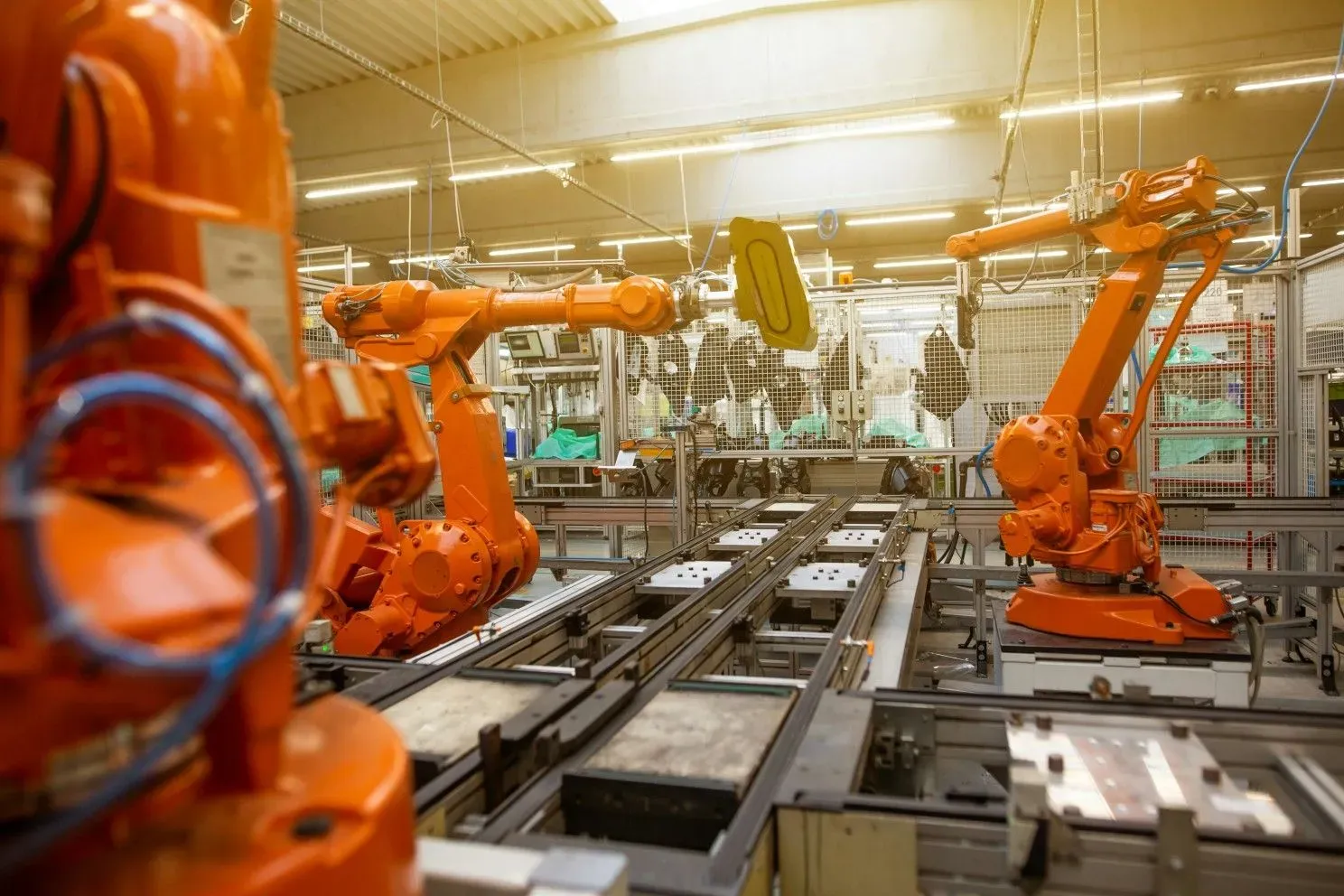Step into Industry 4.0!
Apr 26, 2024
Merge the physical and digital.
Install better collaboration and interconnection throughout sectors.
Upgrade and increase the efficiency of processes.
Industry 4.0 is here to help your company get the most out of your processes, and consistently drive growth.

Smart Manufacturing = Industry 4.0
The term Industry 4.0 refers to the digitalization of processes, or to put it simply, the application of technology, robotics, and artificial intelligence in the processes of industrial companies.
The digitalized processes provide faster, higher quality outputs and lead to better use of company capacities and more efficient processes.
Industry 4.0 is the result of the 4th Industrial Revolution, which is characterized by increased automation and digitalization throughout the production processes. It not only creates more efficient processes but provides plentiful valuable data which enables better long-term planning and consistent growth with fewer errors along the way.
Although Industry 4.0 applies to every industry, the level of implementation varies based on the industry’s current infrastructure, technologies, and processes. Industries such as manufacturing, transportation, and retailing show greater prospects for digitalization, based on the existing ways of operating, which are easily subjected to increased automation.
According to McKinsey, in the operations-intensive sectors, 58 percent of work activities can be automated with the current technology, which opens the doors for in-depth implementation of the Industry 4.0 approach.
Why Industry 4.0?
- Out-perform the competition – Digitalizing your processes allows you to manage and optimize your production and supply chain processes easily. Combining the valuable data of operations, ERPs, supply chains, and even customer services, you get a detailed overview of all the factors that impact your company's efficiency and successful output. Improved, digitalized processes, along with predictive and prescriptive analytics, enable you to direct your company’s growth and surpass the competition in a quicker and more precise manner.
„According to a 2018 McKinsey Global Institute analysis, Industry 4.0 front-runners – facilities well on their way to adopting AI and other advanced technologies by 2025 – can expect a 122 percent positive cash flow change. Follower companies can expect just 10 percent, while companies that wholly fail to adopt AI could see a 23 percent downturn.”
- Tackle any issues with ease – Data analytics can help you notice important trends, identify patterns, and overall, make better decisions, based on clear and concise data, unique to your company. Being able to fully leverage real-time data of your processes at all times, you can predict potential issues, and prepare for potential problem-solving in advance. You get an immediate, detailed overview of your supply chain and production processes, so every intervention can be conducted with great ease and speed.
- Fuel long-term growth – Digitalized processes, minimized downtime and interruptions, a super-charged team, and production, inevitably lead in the direction of more meaningful improvements and greater company results. Constant access to detailed analytics helps you tackle problems quicker and leaves much more room to focus on what matters, long-term, consistent growth.
How does Industry 4.0 work?
The core of Industry 4.0 is based on modern technologies that upgrade the current processes and existing systems, providing new and more efficient ways for the structures to operate.
- Internet of Things – also known as IoT, connects all the manufacturer’s machines with the help of sensors, which enable communication among the machines and other web-enabled devices. Each of the sensors carries a unique IP address, which makes it easy to detect and follow. This provides valuable insights for the machine itself, and at the same time, the machine as a part of the whole system.
- Artificial Intelligence and Machine Learning – AI and ML provide an efficient way to utilize the data collected from the machines. They not only gather and compile all the information but also predict and alarm for advanced responses to potential issues, such as malfunctions or the need for maintenance.
- Cybersecurity – Data Protection is an essential element of the digital transformation processes. Protection from malware and malicious attacks is a key component that ensures safe, and easy-to-handle organization in each segment of the company’s processes.
- Cloud Computing – Cloud Computing is another key component of the smart-manufacturing process. The large amounts of data gained from digitalization are processed and analyzed more efficiently and cost-effectively by using a cloud. It enables easier connectivity and coordination by providing a seamless integration of all included segments.
Where to begin?
Intertec has valuable experience implementing smart manufacturing processes for numerous clients with various areas of expertise.
Take a look at how we helped our client Meraxis streamline their sales process, improve their user experience, and provide transparency to their end customers: https://www.intertec.io/digitization-of-polymer-distribution
Contact us, and we will guide you through the digitalization process, starting with developing a long-term plan, defining a roadmap, and ongoing support in the implementation process.
Let’s step into the Fourth Industrial Revolution together!

Intertec
Marketing Team






